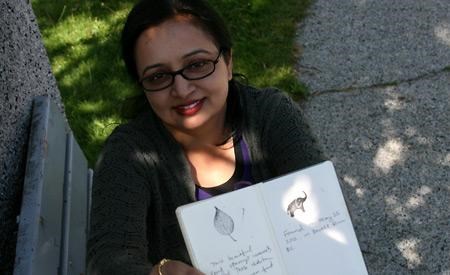“Start at the flag pole. Walk to the ‘Brown’ stone. Walk south along that stone’s line till you get caught up in a ‘Webb.’ Look east for the tree that is not a tree with a flower that is not a flower. Directly north is a tree of three. There you will find the Headless Horseman of Defiance.”
With this clue in hand the Letterboxing enthusiast heads out for the day, eager to add another artistic stamp to the Letterboxing notebook that is heavy in his pocket. Secrecy is paramount—he doesn’t want anyone to notice and follow. This is his find, and his find alone. He has tried to memorize the clue, but needs to check the details once or twice.
“Tree that is not a tree,” he mutters. “Flower that is not a flower…” Finally, he sees it. There is such satisfaction in solving the puzzle. He spots a corner of the letterbox, hidden carefully, and looks over his shoulder to make sure no one is watching before he extracts it from its hiding place. Quickly he stashes the letterbox under his coat, and takes it to a nearby bench where he removes the notebook, pen, ink pad and stamp inside. He carefully stamps his own notebook, noting with glee that the pattern is a headless horseman. He then takes out his own stamp—one he carefully carved out of an eraser—and leaves his mark in the notebook from the letterbox, along with a short note for the next finder to enjoy.
This summer Powell River Public Library, with the help of Powell River Literacy Council, is launching Letterboxing in the community. Letterboxing, which is like a modern-day social-networking adventure, dates back to the Victorian era. It started in the mid-1800s in Devon, England when a walker left a bottle near a walking trail on the moors. Inside the bottle he left his calling card and an invitation to those who found the bottle to add theirs. It was a kind of exclusive hiker’s club—a way to say “I was here”—or some might say a status update of sorts.
Over the decades Letterboxing was forgotten, but after an article was published about it in Smithsonian magazine in 1998 it was revived in North America, though in a somewhat altered form. Today, people all over the continent are participating in this activity by creating letterboxes and hiding them for others to find. Registered participants (at www.letterboxing.org) have access to clues that lead them to letterboxes concealed in cities all over the continent. The library’s version of Letterboxing will incorporate online social networking, as participants will access their weekly clues on the library’s Facebook and Twitter pages.
“When people think of social networking today they automatically think of online sites like Facebook and Twitter or LinkedIn and Pinterest,” said Jomichele Seidl, assistant chief librarian. “But Letterboxing is one example of the fact that social networking has a much longer history; it has been around, in one form or another, for as long as humans have been interacting with one another. We are excited to be linking the past with the present, bringing art, history, technology and adventure together in this fun activity that people all over North America are getting really excited about.”
Seidl explained how Letterboxing works. “Each Friday, starting May 25, we will reveal the location of a new letterbox that has been planted somewhere in Powell River. People can follow clues to the location of the letterbox, which will have a small journal, a pen, an ink pad and a stamp inside.” Participants should carry their own stamp and collector’s journal (any blank notebook will do), and when they find the letterbox they can use the enclosed stamp to mark their own journal and leave their own stamp imprint with a short note in the guestbook which stays with the box. A suggestion for something to write about (for example, “What can you hear right now?”) will be placed with each box.
“Letterboxing is a fun activity that kids can do with their families,” said Seidl. “But it’s not just for kids. Adults all over the world are letterboxing enthusiasts.” To participate, all people have to do is “Like” the library’s Facebook page or follow the library on Twitter. By visiting www.powellriverlibrary.ca, readers can find out more.
“The library’s letterboxes will remain in place indefinitely,” she added. “At the end of each month we’ll register them on the website for Letterboxing North America so there’s a permanent home for the clues that people can access, and so people from outside Powell River can see that there is a Letterboxing presence here.”
The fun in Letterboxing is partly about creating a personalized, unique stamp. The library will hold a stamp-making workshop for teens 13 to 18 years starting at 7 pm on Monday, May 28 at the Youth Resource Centre on Joyce Avenue. Another workshop for adults will be held from 7 to 8:30 pm on Thursday, June 7 at the library. Due to limited space, people who would like to participate in the adult workshop should pre-register at the library by calling 604.485.4796.
Emma Levez Larocque is the literacy outreach coordinator for Powell River.



